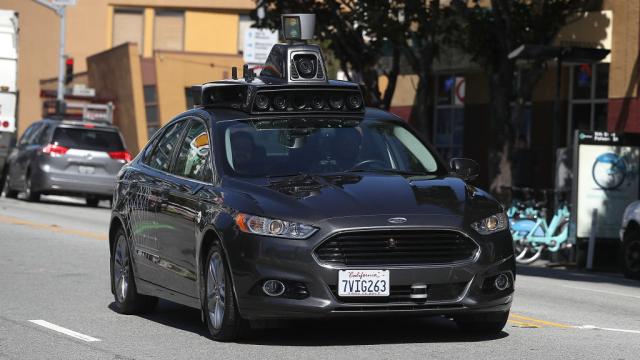Uber laid out new details in a court filing today about how it learned the former lead of its self-driving car unit, Anthony Levandowski, took documents from Google, his former employer.
The ride-hailing company has long maintained that it didn’t know Levandowski had allegedly downloaded 14,000 documents from Google’s autonomous vehicle unit before leaving to launch his own startup, Otto, which Uber acquired. Google’s self-driving car company, Waymo, sued Uber in February, claiming that Levandowski had stolen trade secrets and used them to develop autonomous technology for Uber.
But, as Uber has fought to keep its due diligence report on the Otto acquisition secret, it’s seemed more and more likely that Levandowski’s behaviour might have raised red flags during due diligence. Waymo lawyers alleged as much, writing in a filing that the due diligence investigation was “designed specifically to uncover — or confirm — the downloaded Waymo files in Otto’s or Levandowski’s possession.”
Uber’s attorneys now say that executives at Otto and Uber, including then-CEO Travis Kalanick, knew that Levandowski had five discs of Google data at home — but that all of the executives vehemently forbid him from bringing that data to Uber, and that Levandowski eventually destroyed the discs.
It’s also not clear that the discs, which Levandowski first discussed with his Otto co-founder Lior Ron before broaching the subject with Uber, contained information about self-driving car development. Instead, Uber’s filing suggests that Levandowski took the discs home during a dispute with Google about bonus payment. Here’s the filing:
Uber believes that the downloading was done in relation to Levandowski’s employment at Google, specifically to ensure the expected payment of Levandowski’s $157 million bonus from Google. Of that total bonus, approximately $65 million was payable as of October 2015, but was paid in late December 2015, and approximately $92 million was paid in August 2016. Uber’s factual investigation and discovery is ongoing but we anticipate presenting this and other evidence at trial.
The language is a little vague here (and Uber declined to elaborate on it) but it sure sounds like Levandowski may have used Google documents as leverage in a dispute with Google over bonus payments.
The timeline Uber presents for the bonus disagreement lines up with key dates in the Waymo lawsuit. Levandowski allegedly downloaded the 14,000 documents in December 2015 — around the same time he received the $65 million payment. The second payout, $92 million, was paid just before Uber announced its acquisition of Otto.
Google raised the issue of the bonus in an arbitration proceeding it brought against Levandowski for allegedly poaching Google employees to join Otto. The arbitration filing claims that Levandowski first approached Google employees about joining his new startup around August 2015 — the same timeframe when he expected to receive his bonus, Uber’s filing reveals.
The fact that Levandowski hid his work on the new startup, Google said, “allowed Levandowski to ultimately collect over $157 million in incentive payments from Google for his supposed contributions to Google’s self-driving car project — all while breaching his obligations to Google and building a company that would compete with Google.”
Waymo says that Levandowski’s relationship with Uber preceded the dispute over bonuses — the company claims Levandowski was meeting with Uber executives as early as May 2015. Waymo also notes that Levandowski’s downloads didn’t just sync up with the bonus schedule — they also happened on dates when he was meeting with Uber.
“Mr. Levandowski and Lior Ron were meeting on December 11, 2015 with Uber executives and discussing LIDAR,” a Waymo filing says. “Later that same day, the undisputed evidence of record indicates that Mr. Levandowksi downloaded 14,000 proprietary files from Waymo servers.”
Google’s arbitration proceeding doesn’t mention the specific dates on which Levandowski was set to receive his bonus. The $US120 ($157) million was tied to technical milestones, which Levandowski was required to meet in order to earn the money.
Levandowski told Kalanick and two others on Uber’s corporate development team about the discs he had at home on March 11, 2016, according to Uber’s filing. Kalanick responded by telling Levandowski not to bring the data to Uber and to speak with a lawyer. (Levandowski also signed employment agreements with Uber and Otto saying he would not bring confidential information from any former employer to Uber.) Levandowski told Ron later that day that he destroyed the discs.
“No Uber employee is aware of Levandowski ever using any Google proprietary information in the performance of his duties at Ottomotto or Uber,” Uber’s filing states.
After Levandowski invoked his Fifth Amendment rights and refused to cooperate with the investigation into Waymo’s claims, Uber fired him. The investigation has been extensive, court filings say, with Waymo’s lawyers spending 55 hours inspecting Uber’s technology in both its San Francisco and Pittsburgh headquarters.
Although Waymo has yet to present evidence that Uber used all of the nearly 100 trade secrets it claims were stolen, the judge presiding over the case has said that Waymo’s case on at least two of the trade secrets is strong.
“The bottom line is the evidence indicates that Uber hired Levandowski even though it knew or should have known that he possessed over 14,000 confidential Waymo files likely containing Waymo’s intellectual property; that at least some information from those files, if not the files themselves, has seeped into Uber’s own LiDAR development efforts; and that at least some of said information likely qualifies for trade secret protection,” Judge William Alsup wrote in a preliminary injunction.
